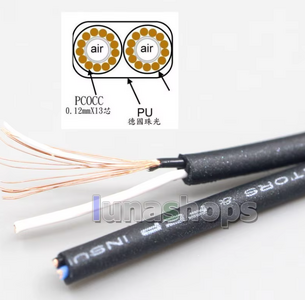I just ordered PCOCC (Pure Crystal by Ohno Continuous Casting) copper headphone cables for my Hifiman He1000V2 Stealth headphones. Japanese Conductors & PEP Insulated-Designed In The Switzerland. Not the most attractive cables but the insulation on those look good.
I purchased these purely based on my curiosity, just want to know, what's the deal with these PCOCC?
The OCC process does force out a lot of the oxygen because when you heat anything like water, when heated, starts to deplete in oxygen. PCOCC takes this process further but don't know exactly what this entails?
Silver is ~7% more conductive than copper. Greater conductivity don't necessarily equate to better sound quality but what I have been hearing from other commentators about PCOCC that it's a lot more neutral than silver and it needs to be broken in. (PC = Pure C**p ha ha ha!)
First we had OFC, then OCC and more recently PCOCC; it is essentially mostly marketing. It isn't so much about single crystalline copper weaning the magic or the mythology that expensive cables make a difference, it's more about proper insulation and good construction that negates greatly the degradation of the signal and, which of the conductive metals are best at delivering the fidelity of the signal. Does it matter?
I'm not really trying to engage in "Do cables matter" debate, this is more about what is the best approach in terms of design, which of the conductive metals make the best cables in terms of delivering degradation free signal?
Extend this conversation also to connectivity, are rhodium interconnects better than gold plated ones?
What's the deal?
Oh BTW; Snake Oil make poor cables but possibly better suited as an ointment for muscular pain 🙂

I purchased these purely based on my curiosity, just want to know, what's the deal with these PCOCC?
The OCC process does force out a lot of the oxygen because when you heat anything like water, when heated, starts to deplete in oxygen. PCOCC takes this process further but don't know exactly what this entails?
Silver is ~7% more conductive than copper. Greater conductivity don't necessarily equate to better sound quality but what I have been hearing from other commentators about PCOCC that it's a lot more neutral than silver and it needs to be broken in. (PC = Pure C**p ha ha ha!)
First we had OFC, then OCC and more recently PCOCC; it is essentially mostly marketing. It isn't so much about single crystalline copper weaning the magic or the mythology that expensive cables make a difference, it's more about proper insulation and good construction that negates greatly the degradation of the signal and, which of the conductive metals are best at delivering the fidelity of the signal. Does it matter?
I'm not really trying to engage in "Do cables matter" debate, this is more about what is the best approach in terms of design, which of the conductive metals make the best cables in terms of delivering degradation free signal?
Extend this conversation also to connectivity, are rhodium interconnects better than gold plated ones?
What's the deal?
Oh BTW; Snake Oil make poor cables but possibly better suited as an ointment for muscular pain 🙂

Last edited:

